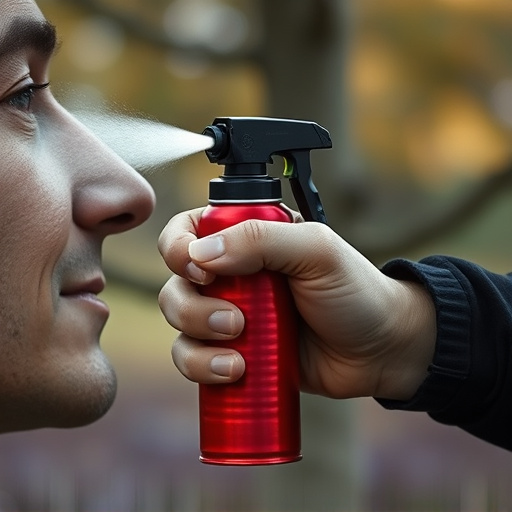Pepper spray, a non-lethal self-defense tool using capsaicin, is subject to varying Pepper Spray Laws by State. Understanding these laws, including permit requirements, spray types, and prohibited uses, is crucial for legal compliance and effective personal safety. Proper usage techniques and knowledge of local regulations ensure responsible self-protection.
“Tactical pepper spray is a powerful tool for personal safety, but understanding its effectiveness and legalities is crucial. This comprehensive guide explores how pepper spray can enhance self-defense strategies, with a focus on Pepper Spray Laws by State. From choosing the right spray for your needs to navigating legal implications, we cover it all. Learn about the impact of pepper spray, state-specific regulations, and essential training techniques to ensure responsible and effective use.”
- Understanding Pepper Spray Effectiveness for Self-Defense
- Pepper Spray Laws: A Comprehensive Guide by State
- Choosing the Right Tactical Spray for Your Needs
- Legal Implications and Off-Limits Areas to Use Pepper Spray
- Self-Protection Training: Incorporating Pepper Spray Techniques
Understanding Pepper Spray Effectiveness for Self-Defense
Pepper spray has emerged as a popular self-defense tool, offering individuals a means to deter and incapacitate potential attackers. However, understanding its effectiveness is crucial before relying on it for personal safety. The active ingredient in pepper spray, capsaicin, irritates the eyes, nose, and respiratory system, leading to temporary disorientation and immobility in the target. This can provide valuable time for an individual to escape or seek help.
When considering tactical pepper spray for self-defense, it’s essential to be aware of Pepper Spray Laws by State. These laws vary widely across different jurisdictions, regulating the type, amount, and accessibility of pepper spray. Staying informed about these regulations ensures legal compliance and helps individuals make informed choices when selecting a self-defense tool.
Pepper Spray Laws: A Comprehensive Guide by State
Knowing the pepper spray laws in your state is crucial for responsible self-defense. Each U.S. state has its own regulations regarding the carrying, use, and possession of pepper spray, also known as oleoresin capsicum (OC) spray. These laws vary significantly from one state to another, affecting both the accessibility and effective use of pepper spray for personal safety.
When considering tactical pepper spray for self-protection, it’s essential to understand your rights and responsibilities under Pepper Spray Laws by State. Some states allow open carry without a permit, while others mandate a concealed carry permit or even registration. Additionally, specific restrictions on OC spray types, capacities, and strengths are common, with certain states prohibiting the use of pepper spray against law enforcement officers or in specific situations like schools or workplaces. Staying informed about these laws enables you to make an informed decision when choosing a tactical pepper spray that aligns with your state’s regulations for optimal self-protection.
Choosing the Right Tactical Spray for Your Needs
Choosing the right tactical spray for your self-protection needs is a crucial step, as different pepper sprays cater to diverse scenarios and user preferences. Consider factors like concentration—the higher the capsaicin percentage, the more potent the spray—and range, which dictates how far you can effectively deploy it. You’ll also want to look into spray pattern and delivery mechanism; some models offer a wider fan-like spray for better coverage while others focus on a direct, stream-like application.
Remember to check local Pepper Spray Laws by State before making your purchase. Regulations vary widely, so ensure the type and amount of pepper spray you opt for complies with your region’s legal requirements. Additionally, familiarise yourself with proper usage techniques to maximise its effectiveness in a critical situation.
Legal Implications and Off-Limits Areas to Use Pepper Spray
Using pepper spray for self-defense can be a powerful tool, but it comes with significant legal implications. The laws surrounding pepper spray vary greatly by state, so understanding your local Pepper Spray Laws by State is crucial before considering its purchase and use. Some states have strict regulations on who can possess and carry pepper spray, while others have more permissive policies. It’s important to note that using pepper spray in public places or against law enforcement officers could lead to serious legal consequences, including charges of assault or battery.
Off-limits areas for pepper spray deployment include schools, workplaces, and public transportation hubs. Additionally, using pepper spray in a way that causes excessive harm or inflicts pain beyond what is necessary for self-defense may result in civil lawsuits. Always consult local law enforcement or legal professionals to understand the specific regulations in your area to ensure you remain within legal boundaries when considering tactical pepper spray for self-protection.
Self-Protection Training: Incorporating Pepper Spray Techniques
Self-protection training is an essential component in equipping yourself with the knowledge and skills needed for personal safety. Incorporating pepper spray techniques into your self-defense regimen can be a game-changer, as it offers a powerful non-lethal option for deterring potential threats. Pepper spray, also known as oleoresin capsicum (OC) spray, is a legal self-defense tool in many states, with varying regulations known as Pepper Spray Laws by State. Understanding these laws and practicing proper usage can significantly enhance your ability to defend yourself effectively.
Training sessions should cover not just how to use the spray but also when and where it’s most effective. This includes learning about the different types of pepper spray, their strengths, and their range. Moreover, understanding the legal implications and knowing the specific regulations in your state is crucial before carrying and using pepper spray for self-protection.
When considering tactical pepper spray as a self-defense tool, staying informed is paramount. Understanding its effectiveness and learning about state-specific laws (like those regarding Pepper Spray Laws by State) will ensure you make a responsible decision. The right spray can be a game-changer in potentially dangerous situations, but it’s crucial to use it legally and effectively. Incorporating self-protection training that includes pepper spray techniques can further enhance your safety and peace of mind. Remember, knowledge is power, especially when it comes to protecting yourself.
